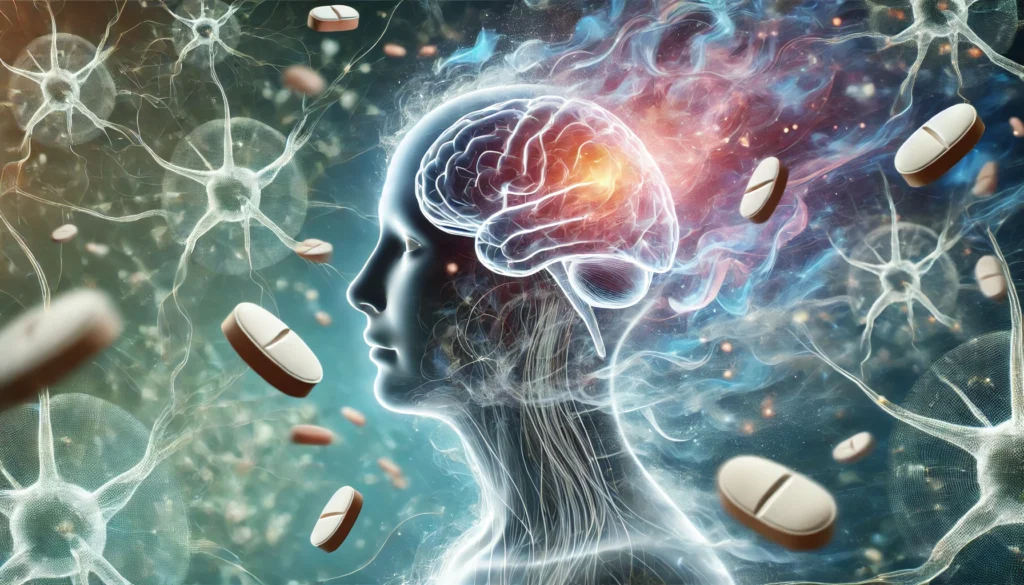Amitriptyline, a tricyclic antidepressant, is primarily prescribed to alleviate symptoms of depression and chronic pain. However, like many medications, it comes with its own set of side effects, some of which may impact cognitive functions. In this article, we delve into the relationship between amitriptyline and memory function, examining the potential effects and offering a nuanced perspective on its usage.
You may also like: Understanding the Science Behind Lost Memory
Understanding Amitriptyline
Amitriptyline has been a staple in the treatment of depression since the 1960s. As a tricyclic antidepressant, it works by increasing the levels of serotonin and norepinephrine in the brain, chemicals that help elevate mood and relieve pain. Despite its efficacy, users and healthcare providers have raised concerns over its cognitive side effects, particularly memory impairment.
Historical Context and Development
Amitriptyline was first introduced in the 1960s, marking a significant advancement in antidepressant medication. It was developed during a time when the understanding of neurotransmitter involvement in mood disorders was burgeoning. The drug quickly gained popularity due to its effectiveness in treating major depressive disorders and was often considered a first-line treatment for various mental health conditions.
Pharmacological Properties
The pharmacological properties of amitriptyline contribute to its widespread use. It is a potent inhibitor of serotonin and norepinephrine reuptake, which increases the levels of these neurotransmitters in the brain. These chemical alterations result in mood stabilization and pain relief, making it beneficial for both depression and chronic pain syndromes. However, its broad action on multiple neurotransmitter systems, including the cholinergic system, can lead to cognitive side effects.
Common Uses Beyond Depression
Beyond its primary use in depression, amitriptyline is often prescribed for chronic pain conditions such as fibromyalgia, neuropathic pain, and migraines. Its analgesic properties make it a valuable option for patients who require both mood stabilization and pain management. This dual functionality highlights its versatility but also underscores the importance of understanding its full range of effects, including potential cognitive impacts.
Amitriptyline and Memory: Analyzing the Connection
Memory Impairment: Fact or Fiction?
The connection between amitriptyline and memory loss has been a topic of debate. Research indicates that while some users report memory issues, the scientific community has yet to reach a consensus. Memory impairment could be attributed to the anticholinergic effects of the drug, which interfere with acetylcholine, a neurotransmitter vital for memory and learning.
Reports from Patients
Many patients have reported experiencing varying degrees of memory impairment while on amitriptyline. These anecdotal accounts often describe difficulties with short-term memory, such as forgetting appointments or conversations. While these experiences are subjective, they highlight the need for further investigation into the cognitive side effects of the medication.
Clinical Observations
Clinical observations have provided mixed results regarding the cognitive effects of amitriptyline. Some healthcare providers note that memory issues are more pronounced in certain populations, such as the elderly or those with pre-existing cognitive vulnerabilities. This variability suggests that individual differences play a significant role in the drug’s impact on memory.
Mechanistic Insights
Mechanistic insights into how amitriptyline may cause memory impairment focus on its anticholinergic properties. By blocking acetylcholine receptors, the drug can disrupt memory consolidation and retrieval processes. Understanding these mechanisms can help in developing strategies to mitigate cognitive side effects while maintaining therapeutic efficacy.
Studies and Findings
Several studies have explored the cognitive effects of amitriptyline. A notable study published in the Journal of Clinical Psychopharmacology observed a decline in memory performance in patients on high doses of amitriptyline. Conversely, other research suggests that memory impairment is more prevalent in older adults or those with pre-existing cognitive conditions.
High-Dose Effects
Research on high-dose effects indicates that memory impairment may be dose-dependent. Patients on higher doses of amitriptyline tend to report more significant cognitive disturbances, including difficulties with attention and memory retention. This finding underscores the importance of careful dosing to balance therapeutic benefits with cognitive risks.
Population-Specific Research
Population-specific research has revealed that certain groups, such as older adults, are more susceptible to amitriptyline’s cognitive side effects. Age-related changes in brain chemistry and pre-existing cognitive decline can exacerbate the drug’s impact on memory. This highlights the need for tailored treatment approaches for vulnerable populations.

Comparative Studies
Comparative studies have assessed the cognitive side effects of amitriptyline relative to other antidepressants. These studies often find that the strong anticholinergic properties of amitriptyline result in more pronounced memory issues compared to medications like SSRIs. Such comparisons can guide treatment decisions, especially for patients concerned about cognitive health.
Comparing Amitriptyline with Other Antidepressants
When juxtaposed with other antidepressants, amitriptyline’s impact on memory appears more pronounced due to its strong anticholinergic properties. Selective serotonin reuptake inhibitors (SSRIs), for instance, exhibit fewer cognitive side effects, making them a preferred choice for patients concerned about memory.
SSRIs vs. Tricyclics
SSRIs, such as fluoxetine and sertraline, are often favored over tricyclics like amitriptyline due to their more favorable side effect profiles. While both classes of drugs aim to increase serotonin levels, SSRIs do so with less impact on other neurotransmitter systems, reducing the risk of cognitive side effects. This makes them an attractive option for those prioritizing cognitive health.
Anticholinergic Burden
The concept of anticholinergic burden is crucial in understanding amitriptyline’s impact on memory. Medications with high anticholinergic activity, like amitriptyline, can accumulate in the body and exacerbate cognitive decline over time. Awareness of this burden can inform prescribing practices and help minimize cognitive risks.
Patient Preferences
Patient preferences often lean towards antidepressants with fewer cognitive effects. Many individuals prioritize maintaining cognitive function, especially those in mentally demanding professions or those with a history of cognitive issues. Understanding these preferences can help healthcare providers tailor treatment plans that align with patients’ goals and concerns.
Mitigating Memory-Related Side Effects
While the potential for memory impairment exists, there are strategies to minimize these effects without compromising the therapeutic benefits of amitriptyline.
Dosage Adjustment and Monitoring
Close monitoring and dosage adjustment can help mitigate memory-related side effects. Healthcare providers should tailor the dosage to the patient’s specific needs, balancing efficacy and cognitive health.
Importance of Titration
Titration, or gradually adjusting the dosage, is a crucial strategy in managing amitriptyline’s side effects. Starting with a lower dose and incrementally increasing it allows the body to adapt, potentially reducing the risk of cognitive disturbances. This approach requires careful monitoring by healthcare providers to ensure optimal outcomes.
Regular Cognitive Assessments
Incorporating regular cognitive assessments into treatment plans can help detect early signs of memory impairment. Tools such as memory tests or cognitive screening questionnaires can provide valuable insights into a patient’s cognitive health. These assessments enable timely interventions and adjustments to the treatment regimen.
Collaborative Decision-Making
Collaborative decision-making between patients and healthcare providers is vital in managing side effects. Open communication about concerns and preferences allows for a personalized approach to treatment. Patients who feel involved in their care are more likely to adhere to medication regimens and report side effects promptly.
Lifestyle Modifications
Incorporating lifestyle changes can also support cognitive function. Regular physical exercise, a balanced diet rich in omega-3 fatty acids, and mental exercises like puzzles and reading can help maintain memory and overall cognitive health.
Physical Activity and Brain Health
Engaging in regular physical activity has been shown to enhance cognitive function and protect against memory decline. Exercise increases blood flow to the brain, promotes the release of neurotrophic factors, and supports neurogenesis. Patients on amitriptyline can benefit from incorporating activities like walking, yoga, or swimming into their routines.
Nutritional Support
A balanced diet that includes omega-3 fatty acids, antioxidants, and other brain-boosting nutrients can support cognitive health. Foods such as fatty fish, berries, nuts, and leafy greens have been associated with improved memory and reduced risk of cognitive decline. Healthcare providers can offer dietary recommendations to complement pharmacological treatments.
Cognitive Training
Cognitive training exercises, such as puzzles, memory games, and learning new skills, can help maintain and enhance cognitive function. These activities stimulate neural pathways and promote brain plasticity, potentially mitigating the cognitive effects of medications like amitriptyline. Encouraging patients to engage in regular cognitive exercises can be a valuable component of their treatment plan.
Alternative Treatments
For those who experience significant memory impairment, exploring alternative treatments may be beneficial. Cognitive-behavioral therapy (CBT) and newer antidepressants with fewer cognitive side effects could be viable options.
Cognitive-Behavioral Therapy (CBT)
CBT is a non-pharmacological approach that can effectively treat depression and anxiety without the risk of cognitive side effects. It focuses on changing negative thought patterns and behaviors, providing patients with tools to manage their symptoms. CBT can be used alone or in conjunction with medication to enhance treatment outcomes.
Exploring Newer Antidepressants
Newer antidepressants, such as serotonin-norepinephrine reuptake inhibitors (SNRIs) or atypical antidepressants, may offer similar benefits with fewer cognitive side effects. These medications target specific neurotransmitter pathways, minimizing the anticholinergic burden. Patients experiencing cognitive issues with amitriptyline may find these alternatives more suitable.
Integrative Approaches
Integrative approaches that combine medication, therapy, lifestyle changes, and complementary therapies can provide a holistic solution for managing depression and cognitive health. Techniques such as mindfulness meditation, acupuncture, or herbal supplements may offer additional benefits. Healthcare providers can work with patients to develop a comprehensive treatment plan that addresses all aspects of well-being.
The Role of Healthcare Providers
Healthcare providers play a crucial role in managing the cognitive side effects of amitriptyline. A comprehensive approach, including thorough patient assessments and regular follow-ups, is essential to ensure optimal treatment outcomes.
Patient Education
Educating patients about the potential side effects of amitriptyline, including its impact on memory, empowers them to make informed decisions about their treatment. Clear communication regarding symptoms to watch for and when to seek medical advice is vital.

Informative Consultations
During consultations, healthcare providers should offer detailed information about amitriptyline’s potential side effects, including memory impairment. By explaining the mechanisms behind these effects and addressing patient concerns, providers can foster trust and ensure patients are well-informed about their treatment options.
Written Resources
Providing written resources or pamphlets about amitriptyline can help reinforce verbal information given during consultations. These materials can include tips for managing side effects, lifestyle recommendations, and a list of warning signs that warrant medical attention. Written resources serve as valuable references for patients between appointments.
Encouraging Open Dialogue
Encouraging open dialogue between patients and healthcare providers is essential for effective treatment. Patients should feel comfortable discussing any side effects or concerns they experience, knowing that their input is valued and can influence treatment decisions. Building a strong patient-provider relationship enhances treatment adherence and outcomes.
Personalized Treatment Plans
Developing personalized treatment plans can help mitigate memory-related side effects. By considering the patient’s medical history, lifestyle, and treatment goals, healthcare providers can offer tailored solutions that address both mental health and cognitive well-being.
Comprehensive Assessments
Comprehensive assessments that include medical history, lifestyle factors, and cognitive evaluations are crucial for developing personalized treatment plans. These assessments provide a holistic view of the patient’s health, allowing providers to tailor interventions that address specific needs and risks.
Collaborative Goal Setting
Collaborative goal setting between patients and healthcare providers ensures that treatment plans align with patient priorities and values. By discussing treatment objectives and potential side effects, providers can develop strategies that balance efficacy with cognitive health. This collaborative approach fosters patient engagement and adherence.
Continuous Evaluation and Adjustment
Continuous evaluation and adjustment of treatment plans are necessary to address evolving patient needs. Regular follow-ups and cognitive assessments allow providers to monitor progress and make timely adjustments to medication or interventions. This dynamic approach ensures that treatment remains effective and minimizes cognitive risks.
Future Directions in Research
As we advance in our understanding of antidepressants and their effects on cognition, ongoing research is crucial. Investigating the nuances of amitriptyline’s impact on memory will provide deeper insights and inform future treatment protocols.
Exploring Novel Therapeutics
The development of novel therapeutics with minimal cognitive side effects could revolutionize depression treatment. By targeting specific neurotransmitter pathways, researchers aim to create medications that offer relief without compromising cognitive function.
Targeting Specific Pathways
Future research aims to develop medications that selectively target specific neurotransmitter pathways involved in mood disorders. By focusing on precise mechanisms, these drugs could provide therapeutic benefits without affecting cognitive function. This approach holds promise for creating safer antidepressants with fewer side effects.
Advances in Drug Design
Advances in drug design and pharmacogenomics are paving the way for personalized medicine approaches. By understanding individual genetic variations and their influence on drug metabolism, researchers can develop tailored treatments that optimize efficacy while minimizing cognitive risks. This personalized approach could revolutionize how antidepressants are prescribed.
Collaboration and Innovation
Collaboration between researchers, pharmaceutical companies, and healthcare providers is essential for advancing therapeutic innovations. By pooling resources and expertise, stakeholders can accelerate the development of new treatments and improve our understanding of existing medications like amitriptyline. Such collaboration fosters innovation and improves patient care.
Longitudinal Studies
Longitudinal studies examining the long-term effects of amitriptyline on memory will provide a more comprehensive understanding of its cognitive impact. Tracking cognitive changes over time can help identify at-risk populations and inform treatment adjustments.
Identifying Risk Factors
Longitudinal studies can help identify risk factors that predispose individuals to cognitive side effects from amitriptyline. By examining factors such as age, genetic predispositions, and comorbidities, researchers can pinpoint populations that may require closer monitoring or alternative treatments.
Monitoring Cognitive Trajectories
Monitoring cognitive trajectories over time can provide insights into how amitriptyline affects memory and cognitive function in different populations. These studies can reveal patterns of cognitive decline or stabilization, informing treatment protocols and patient education strategies.
Informing Clinical Guidelines
The findings from longitudinal studies can inform clinical guidelines and best practices for prescribing amitriptyline. By understanding the long-term cognitive impacts, healthcare providers can make evidence-based decisions that balance the benefits and risks of treatment, ultimately improving patient outcomes.

Conclusion: Balancing Benefits and Risks
Amitriptyline remains a valuable tool in the management of depression and chronic pain. While concerns about memory impairment are valid, they should be weighed against the drug’s therapeutic benefits. With informed decision-making, ongoing research, and personalized care, patients and healthcare providers can navigate these challenges and optimize treatment outcomes.
In the evolving landscape of mental health treatment, the importance of balancing therapeutic efficacy with cognitive health cannot be overstated. Amitriptyline’s role in alleviating depression and pain underscores its value, but awareness of potential memory-related side effects is essential for informed usage. By fostering open communication and exploring alternative treatments, patients and providers can work together to ensure that the benefits of amitriptyline outweigh its risks. As research continues to illuminate the complexities of antidepressant therapy, the hope is for increasingly refined approaches that enhance both mental health and cognitive well-being.
Further Reading:
Dementia caused by amitriptyline?
Effects of antidepressants on cognitive functioning of elderly patients. A review
Amitriptyline selectively disrupts verbal recall from secondary memory of the normal aged
Important Note: The information contained in this article is for general informational purposes only, and should not be construed as health or medical advice, nor is it intended to diagnose, prevent, treat, or cure any disease or health condition. Before embarking on any diet, fitness regimen, or program of nutritional supplementation, it is advisable to consult your healthcare professional in order to determine its safety and probable efficacy in terms of your individual state of health.
Regarding Nutritional Supplements Or Other Non-Prescription Health Products: If any nutritional supplements or other non-prescription health products are mentioned in the foregoing article, any claims or statements made about them have not been evaluated by the U.S. Food and Drug Administration, and such nutritional supplements or other health products are not intended to diagnose, treat, cure, or prevent any disease.


